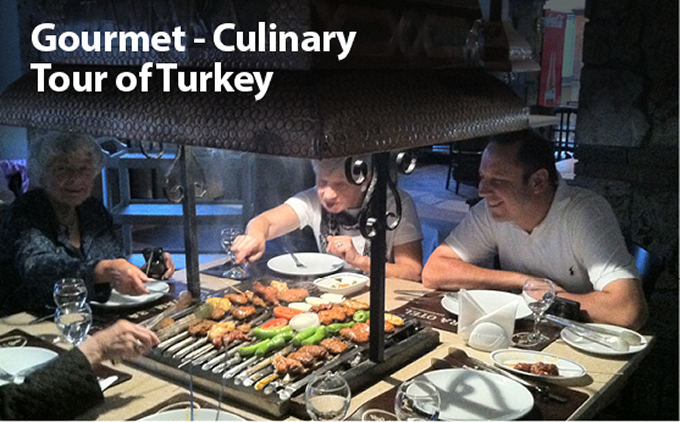Gourmet – Culinary Tour of Turkey
A culinary tour is a type of travel experience that focuses on exploring and experiencing a region’s cuisine and culinary traditions. It involves visiting various restaurants, food markets, farms, wineries, and other food-related establishments to sample local dishes, ingredients, and beverages. Culinary tours offer participants the opportunity to immerse themselves in the culture of a particular area through its food, giving them insights into the region’s history, customs, and way of life.

Culinary Tour Turkey
Turkey wouldn’t be Turkey without its gastronomic heritage, and a culinary food and wine tour is one of the most satisfying ways to explore cultural richness in Turkey. We have designed a luxurious gourmet route blending wine tasting, art history, archaeology, scenery, gourmet experiences and your own cooking classes.
Our planned Culinary tours
Some key points to consider about culinary tours:
- Destination Selection: Culinary tours can be organized in various parts of the world, each known for its unique culinary heritage. Some famous culinary destinations include Italy, France, Thailand, Japan, Mexico, Spain, and many more.
- Activities: Food tours typically include activities such as cooking classes, guided visits to local markets, wine tastings, cheese making demonstrations, and visits to traditional food producers. Participants get to interact with local chefs, food artisans, and farmers to learn about traditional cooking techniques and ingredients.
- Food Sampling: One of the highlights of a food tour is the opportunity to sample a wide range of local dishes. This might include street food, traditional home-cooked meals, regional specialties, and fine dining experiences.
- Cultural Immersion: Food tours often provide insights into the cultural aspects of a region. Food is closely tied to a community’s history, traditions, and values, so participants can gain a deeper understanding of the local way of life.
- Expert Guides: Professional guides or local experts often lead food tours, providing commentary on the history and significance of the foods being sampled, as well as the cultural context.
- Hands-On Learning: Cooking classes are a common component of culinary tours, where participants can learn to prepare local dishes under the guidance of experienced chefs. This hands-on experience can be a fun and educational way to learn about the cuisine.
- Group or Solo Tours: Food tours ↗ can be organized as group tours, allowing participants to share the experience with others who share their interest in food. Alternatively, some individuals may prefer customizing their own solo culinary adventures.
- Duration: The duration of a food tour can vary, ranging from a few days to several weeks, depending on the destination and the depth of exploration desired.
- Budget: The cost of culinary tours varies widely based on factors such as the destination, the level of luxury, the number of inclusions, and the duration of the tour.
- Benefits: Culinary tours can be enriching experiences that provide an intimate look into the local culture and traditions. They offer the chance to learn new cooking skills, taste new flavors, and create lasting memories.
Before embarking on a culinary tour, it’s a good idea to research and plan ahead, considering factors like dietary restrictions, travel logistics, and any necessary travel documents. Whether you’re a dedicated foodie or simply someone who enjoys exploring new cultures through their cuisine, a culinary tour can be a delightful and memorable adventure.




